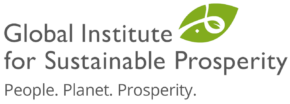Michael Sauvante is a Research Fellow at the Global Institute for Sustainable Prosperity. He brings over 40 years of experience in founding and running more than a half dozen companies and non-profit organizations. He is an expert in new venture creation, also within mature companies including pioneering work at HP Labs, and has long been a progressive thinker in the field of sustainability, corporate social and environmental behavior, and corporate responsibility. Michael also has a deep understanding of general corporate law, corporate securities law, banking and tax law and more.
For the past decade, Michael has conducted extensive research into economic development issues pertaining primarily to small and medium sized enterprises (SMEs) and their critical role in the economic vitality of their communities. That research has focused on getting money into the hands of SMEs through capital formation (investments) and credit facilitation (loans). It also focused on how current laws and structures often impede rather than facilitate those functions, and how disruptive new vehicles and approaches can provide the breakthroughs necessary to lift up those businesses and their local communities. Some of that work helped contribute to the passage of the JOBS Act in 2012.
Michael’s research into local economic development issues has resulted in his writing and publishing an extensive number of articles on banking, securities, currencies and related topics found here, here and under his full bio linked below. This effort led to an in-depth exploration of the use of alternative currencies for economic development, resulting in his article Money – A Time for Change, exploring how such currencies can serve as the overall mechanism that can be used to comprehensively bootstrap local economies, especially stressed economies.
From that knowledge he developed a system called the Sustainable Communities Framework (SCF) for harnessing those ideas into a coherent and integrated regional economic development program. And as this intro document explains, the SCF program very closely maps to all the elements of the Green New Deal (GND), including job creation; small business growth and development; income and wealth disparities; climate change and other environmental issues; infrastructure, housing and energy issues; local farming and food; municipalities, schools, hospitals and other not-for-profit service organizations. The one key exception is that the SCF can be implemented locally now, without waiting for Congress and massive federal funding.
The SCF uses several new entities Michael created starting with a non-profit structure called Commonwealth Development Organizations (CDOs) designed to organize and carry out the overall SCF program in any one region. He and his colleagues at National Commonwealth Group are launching a pilot project based on that SCF strategy on the island of Puerto Rico, introduced in this document and in greater detail here. That effort has attracted attention elsewhere and a number of other regions are already looking to replicate the Puerto Rican SCF model.
This effort has also attracted the attention of leadership with the Centre for Enterprise and Economic Development Research (CEEDR), at Middlesex University in London. Middlesex hosts a top tier business school, of which CEEDR is the leading research centre specializing in local economic development, small business financing and support policy, and social enterprise. CEEDR has awarded Michael an Honorary Research Fellowship in recognition of his pioneering work in the field of local economic development and business financing with National Commonwealth Group, to go along with Michael’s enrollment in the capstone professional doctorate program (DProf) at Middlesex based on his 10 years of research and work in this field.

